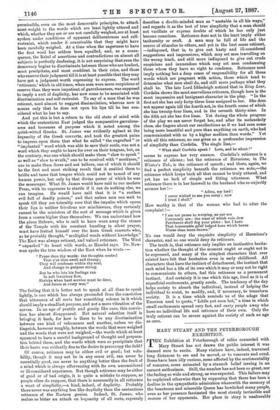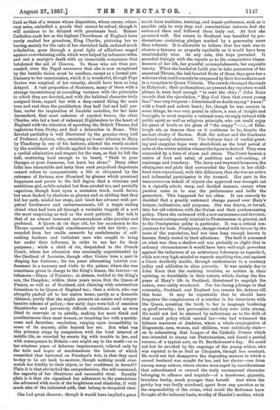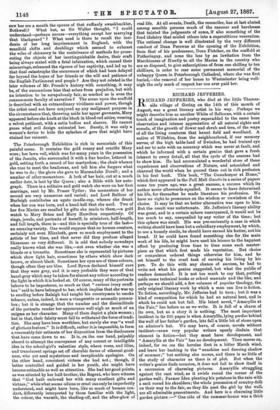MARY STUART AND THE PETERBOROUGH EXHIBITION.
THE Exhibition at Peterborough of relics connected with Mary Stuart has not drawn the public interest it was deemed sure to excite. Many visitors have, indeed, traversed long distances to see and be moved, or to venerate and extoL Some have been idly curious, some affected by the sentimentality of romance, some animated by a staunch belief issuing in an earnest enthusiasm. Still, the number has not been so great, nor the feeling so wide and strong, as was expected. This failure may be explained otherwise than by supposing that there has been a decline in the sympathetic admiration wherewith the memory of the beauteous and miserable Queen has bewitched many people, even as her presence fascinated the most sternly invincible and morose of her opponents. Her place in story is unalterably fixed as that of a woman whose disposition, whose career, whose very mien, embodied a puzzle that cannot be solved, though it will continue to be debated with passionate heat. Roman Catholics exalt her as the highest Churchmen of England have rarely exalted her grandson, King Charles, picturing her as having, mainly for the sake of her cherished faith, endured much tribulation, gone through a great fight of afflictions waged against overwhelming odds, which were helped by infamous wiles, and met a martyr's death with an immovable composure that betokened the aid of Heaven. To those who are thus per- suaded, even the Papal assurance that she is now enraptured by the beatific vision must be needless, except as a formal pre- liminary to her canonisation, which it is wonderful, though Pope Sextns was sceptical of her veracity, should have been so long delayed. A vast proportion of Scotsmen, many of them with a strange inconsistency at exceeding variance with the principles to which they are devoted, and with the habitual character truly assigned them, regard her with a deep.seated liking far more true and real than the predilection they half feel and half pro- fess, under the inspiration of Jacobite melodies, for her later descendant, that most unheroic of reputed heroes, the other Charles, who led a host of unkempt Highlanders to the heart of England with the intention of upsetting the British Throne, fled inglorious from Derby, and died a debauchee in Rome. This devoted partiality is well illustrated by the genuine story told of Professor Aytonn, who, resenting an ironic allusion to Mary by Thackeray in one of his lectures, allowed the wrath excited by the semblance of ridicule applied to the woman to overcome a cordial admiration and respect for the man, so that he left the hall, muttering loud enough to be heard, " Stick to your Georges or your Jeameses, but leave her alone." Many other folks less intractable and testy than such prejudiced disputants. cannot refuse to compassionate a life so chequered by the extremes of fortune, now illumined by gleams which promised happiness and power to the full degree that a winsome and ambitions girl, subtle-minded but firm-minded too, and partially sagacious, though bent upon a mistaken track, could desire, but anon flecked by shadows so gloomy and so abiding that they hid her path, misled her steps, and beset her advance with per- petual hindrances and embarrassments, till a tragic ending closed what had been all through a veritable tragedy of a sort the most surprising as well as the most pathetic. Her tale is that of an almost incessant metamorphosis alike peculiar and profound. A Queen at six days old, for her succession to the Throne opened well-nigh simultaneously with her birth ; sur- rounded from her cradle onwards by confederacies of self- seeking factions and turbulent men who sought to bring her under their influence, in order to use her for their purposes ; while a child of six, despatched to the French Court, where her education was nominally superintended by the Cardinal of Lorraine, though other Guises bore a part in shaping her fortunes ; for ten years alternating betwixt con- finement in a nunnery and visits to the palace, where she was sometimes given in charge to the King's leman, the famous—or infamous—Diana of Poictiers ; at sixteen, wedded to the King's son, the Dauphin ; within three years more, first the Queen of France, as well as of Scotland, and claiming with ostentatious formalism to be Queen of England too ; then a widow, who was abruptly packed off to her native home, partly as a domestic riddance, partly that she might promote an astute and compre- hensive scheme of policy,—her early days were full of ceaseless disquietudes and perversely difficult conditions such as were fitted to enervate or to petrify, making her more timid and pusillanimous than most women, or inspiring her with a mettle- some and dauntless resolution, verging upon insensibility in some of its aspects, alike beyond her sex. But what was this primary stage by comparison with the brief interval of middle life, so crowded by events big with trouble to her, and with consequence to Britain—one might say to the world—or to her nineteen years of dolorous imprisonment, relieved only by the toils and hopes of machinations the labour of which resembled that bestowed on Penelope's web, in that they sped to-day to be set back to-morrow, though nothing could over- match her fidelity to their object, or her confidence in herself ? Plain it is that she lacked the comprehension, the self-command, the sagacity of her illustrious and successful rival. Equally plain is it that she signalised her adherence to the pretensions she advanced with much of the brightness and elasticity, if with much also of the indurated pith, that belong to tempered steel.
She had great chances ; though it would have implied a great revolt from tradition, training, and innate preference, such as is possible only to very deep and conscientious natures, had she embraced them and followed them truly out. At first she promised well. Her return to Scotland was heralded by pro- clamations containing pledges marked by a generosity more than tolerant. It is allowable to believe that her wish was to observe a fairness as properly equitable as it would have been unmistakably wise. At any rate, this hope prevailed. It accorded fittingly with the reports as to the comparative blame- lessness of her life, her graceful accomplishments, her exquisite beauty. When she landed at Leith pier to take possession of her ancestral Throne, the leal-hearted Scots of those days gave her a welcome that could scarcely be surpassed by their descendants now in a reception to Queen Victoria. The crowds thronged the roads to Holyrood ; their acclamations, as present-day reporters would phrase it, were loud enough " to rend the skies ;" John Knox records that the ejaculation, "May God bless that sweet young face!" was very frequent—John himself no doubt saying "Amen 1" with a frank and ardent heart ; for, though he was austere in some things, he was very genial in others, a man of insight and foresight, in most respects a rational man, strongly imbued with public spirit as well as religious principle, who yet could enjoy his game of bowls or his glass of "the nappy "—i.e., of Edin- burgh ale, as famous then as it continues to be, despite the ancient rivalry of Burton. Both the ardour and the frankness suffered speedy abatement. The halcyon days of cordial greet- ing and sanguine hope were short-lived, as the brief period of calm at the winter solstice whence the figure is derived. They were succeeded by a time of storm and stress. The Court became a centre of feud and cabal, of ambition and self-seeking, of espionage and treachery. The fierce and wayward humours, the stratagems and plots that surrounded the Queen in her child- hood were reproduced, with this difference, that she was an active and influential participator in the turmoil. Her part in the manoeuvres on behalf of objects she approved was wrought out in a signally adroit, wary, and decided manner, except when passion came in to mar the performance and bailie the gamesters. This happened far too often. It can scarcely be doubted that a greatly untoward change passed over Mary's temper, inclinations, and purposes. She was drawn, or forced, into her old relations with the Guises and their predominating policy. These she embraced with a new earnestness and devotion. She waxed outrageously inimical to Protestaniem in general. and to the Presbyterian polity in particular. It was a critical con- juncture for both. Presbytery, though viewed with favour by the mass of the population, had not been long enough known to become firmly rooted in their affections. The hold it possessed on what was then a shallow soil was probably so slight that in ordinary circumstances it would have been well-nigh powerless against the influences of an aristocracy lukewarm as regards it, while not very high-minded as regards anything else, and against a Court decidedly hostile, through enthralment to a contrary policy and addiction to alien pursuits. It was mainly due to John Knox that the seething troubles, so sudden in their uprising, no formidable in their nature, which, during the five years of Mary's life in Scotland, threatened to engulph the nation, were safely weathered. For his daring pilotage in that extremity, Scotland, and England too, remain his debtors till this hour. It may be regrettable that he should have forgotten the complaisance of a courtier in his interviews with the Queen, speaking the truth to her in language bordering on gruff severity ; but provocation and duty were alike strong. He could not but be alarmed by indications as to the drift of that occult policy which carried her—who had witnessed the hideous massacre at Amboise, where a whole congregation of Huguenots, men, women, and children, were ruthlessly slain— on to subscribing that League of the Catholic Powers which was intended to stamp out Protestantism, and found a partial success, of a typical sort, on St. Bartholomew's day. He could not but be revolted by the ongoings of the young widow, who was reputed to be as frail as Cleopatra, though less constant. He could not but disapprove the degrading manner in which a second husband was sought for her, and her choice—one from among many suitors, whose claims were urged by considerations that subordinated or crossed the truly sacramental character belonging to affiance and nuptials—of a handsome, gigantic, brainless booby, much younger than herself. And when the gawky boy was foully murdered, apart from any question as to the responsibility of the crime, what could the Reformer have thought of the indecent haste, worthy of Hamlet's mother, which saw her ere a month the spouse of that ruffianly swashbuckler. Bothwell? What but, as Sir Walter thought, "I could understand—perhaps excuse—everything except her marrying that blackguard" ? What need is there to recall the inci- dents of her long imprisonment in England, with the manifold shifts and donblings which seemed to exhaust the wiles of chicanery in the contrivance of methods for prose- cuting the objects of her inextinguishable desire, their craft being always mated with a fatal infatuation, which caused their miscarriage, enhanced the rigours of her captivity, and led up to that final catastrophe the occurrence of which had been delayed far beyond the hopes of her friends or the will and patience of the English Parliament and people ? Are they not related in the later volumes of Mr. Fronde's history with something, it may be, of the unconscious bias that arises irons prejudice, but with an intention to be scrupulously fair, as marked as is even the consummate faculty of narration P The scene upon the scaffold is described with an extraordinary vividness and power, though the artist need not have conjured up any malignant purpose in the circumstance that, throwing aside her upper garments, Mary appeared before she knelt at the block in blood-red attire, wearing a velvet petticoat, with a satin bodice and sleeves. He cannot guess what evil design animated her. Surely, it was only a woman's device to hide the splashes of gore that might have stained her raiment.
The Peterborough Exhibition is rich in memorials of this painful scene. It contains the gold rosary and crucifix Mary wore; her lawn veil, which was for many years in the possession of the Jesuits, who surrounded it with a fine border, lettered in gold, setting forth a record of her martyrdom ; the chair whence she rose to meet the headsman, and tell him she forgave what he was to do ; the glove she gave to Marmaduke Darell ; and a number of other mementoes. A lock of her hair, cat at a much earlier date, is lent by the Queen ; also a Bible with her auto- graph. There is a solitaire and gold watch she wore on her first marriage, sent by Mr. Fraser Tytler ; the mementoes of her second are very numerous and varied ; and Lord Balfour of Burleigh contributes an agate candle-cap, whence she drank when her eon was born, and a hand-bell that she need. Two of her five Maries are recalled by gifts she made to them,—a gold watch to Mary Seton and Mary Hamilton respectively. Of rings, jewels, and portraits of herself, in miniature, half-length, and fall length, there is—and this is specially true of the last— an amazing variety. One would suppose that no human creature, certainly not even Elizabeth, gave so much employment to the artists of her time, and that never did they produce alleged likenesses so very different. It is odd that nobody nowadays really knows what she was like,—not even whether she was a blonde or a brunette. Sometimes she is represented by pictures which show light hair, sometimes by others which show dark brown, or almost black. Sometimes her eyes are of these colours, though often they are blue. Lord Byron declared himself sure that they were grey, and it is very probable they were of that hazel-grey which may be taken for almost any colour according to the light in which it is looked at. Of course, many of the portraits behove to be impostures, as mach as that " curious ivory snuff- box " said to have belonged to her, which implies that she was up to snuffing before Raleigh had taught his countrymen to smoke tobacco, unless, indeed, it were a vinagerette or aromatic pounce- box ; but it is strange that the number and the dissimilitude of the portraits render her appearance well-nigh as much of an enigma as her character. Many of them depict a plain woman ; but in that, their falsity most fail to withstand the force of tradi- tion. She may have been worthless, but surely she was "a weed of glorious feature." It is difficult, rather it is impossible, to form a reasonably fair estimate of her disposition from the disclosures that have come down to us. It is, on the one band, palpably absurd to attempt the conveyance of any correct or intelligible idea in the school-girl's valentine style, where roses, and lilies, and translucent springs set off cherubic forms of ethereal good- ness, who yet need mysterious and inexplicable apologies. On the other hand, consistent virtues she had not ; though, if better controlled and guided in her youth, she might have become estimable as well as attractive. She had her good points, as was attested by her half-brother, the Regent, who bore witness that " God hath endowed her with many excellent gifts and virtues;" while what seems odious or cruel can only be imperfectly understood, and might have been, like so much of human con- duct, differently interpreted by those familiar with the light, the colour, the warmth, the shading-off, and the after-glow of real life. At all events, Death, the reconciler, has at last abated among sensible persons mach of the rancour and harshness that tainted the judgments of some, if also something of the fond idolatry that misled others into a superstitions veneration. The rational change is well illustrated by the very different conduct of Dean Perowne at the opening of the Exhibition, from that of his predecessor, Dean Fletcher, on the scaffold at Fotheringay, and none the lees by an invitation from the Marchioness of Hnntly to all the Marks in the country who are so disposed, to give subscriptions of from one shilling to ten shillings, in order to rear some permanent memorial of the unhappy Queen in Peterborough Cathedral, where she was first buried,—the removal of her bones to Westminster being well- nigh the only mark of respect her eon ever paid her.




































 Previous page
Previous page